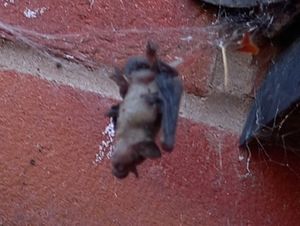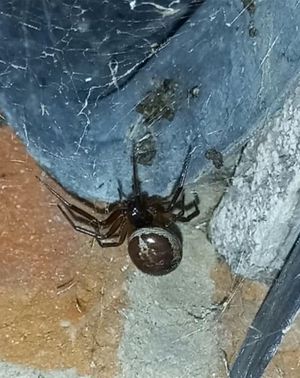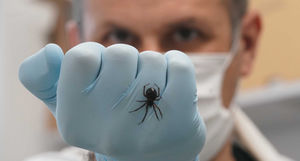Bat-eating spider discovered in North Shropshire is a first for the UK
It has all the makings of a horror movie crossed with a David Attenborough documentary or a superhero blockbuster - a bat-eating spider in North Shropshire.

But naturalist and wildlife artist Ben Waddams, whose discovery is believed to be a first for the UK, says it is natural and part of the fascinating world of creepy crawlies.
His discovery in a small Shropshire village is the first time a member of the False Widow spider family has been recorded preying on a bat or any vertebrate in the UK.
And while he is quick to point out that the Noble False Widow Spider is usually harmless to humans, their capture techniques allow them to prey on vertebrates and even the bats larger than themselves.

His find was picked up by scientists from the National University of Ireland Galway, who have now published the record of the attack on the protected Pipistrelle bats.
Aptly named 'the Webslinger versus Dark Knight', the university paper published in the international journal Ecosphere demonstrates that False Widow spiders continue to impact native species.
It is the first time a member of this family of spiders has been recorded preying on a bat anywhere in the world, or any vertebrate in the UK.

Ben had noticed that he had False Widow spiders around his home in Loppington last summer included a large female. He also knew that he had a maternity roost of Pipistrelle bats under the eaves of the house.
Then, on two consecutive days in July he found bats tangled in web below the entrance to the roost.
The first, a young pup which was dead, was completely immobilised with silk. It was slightly shrivelled and had a red mark - a bite from the spider.
The second, much larger adult bat, was entangled in the web but still alive and Ben was able to rescue it, releasing it from the spider's trap.

Dr Michel Dugon, head of the Venom Systems Lab at the Ryan Institute, National University of Ireland Galway, said: “We have been working on the Noble False Widow for the past five years and we are still surprised by its ability to adapt to new environments and make the most of the resources available. It is a truly remarkable species.”
Dr John Dunbar, lead author of the study, said: “In more exotic parts of the world, scientists have been documenting such predation events by spiders on small vertebrates for many years, but we are only beginning to realise just how common these events occur. Now that this alien species has become well established in Ireland and the UK, we are witnessing such fascinating events on our very own doorstep.
“Even other, much smaller species of false widows are known to capture and feed on snakes and lizards."
Originating from Madeira and the Canary Islands, the Noble False Widow Spider Steatoda nobilis has the potential to become one of the world’s most invasive species of spider.
The team of scientists are encouraging members of the public to email them at falsewidow@nuigalway.ie to report sightings of the Noble False Widow Spider.





